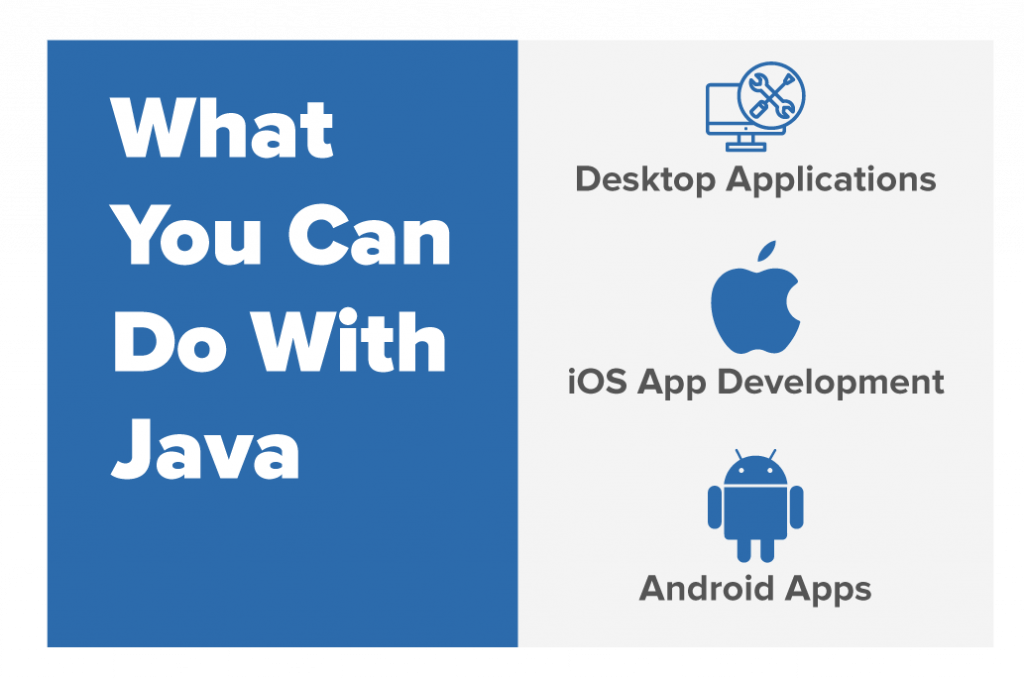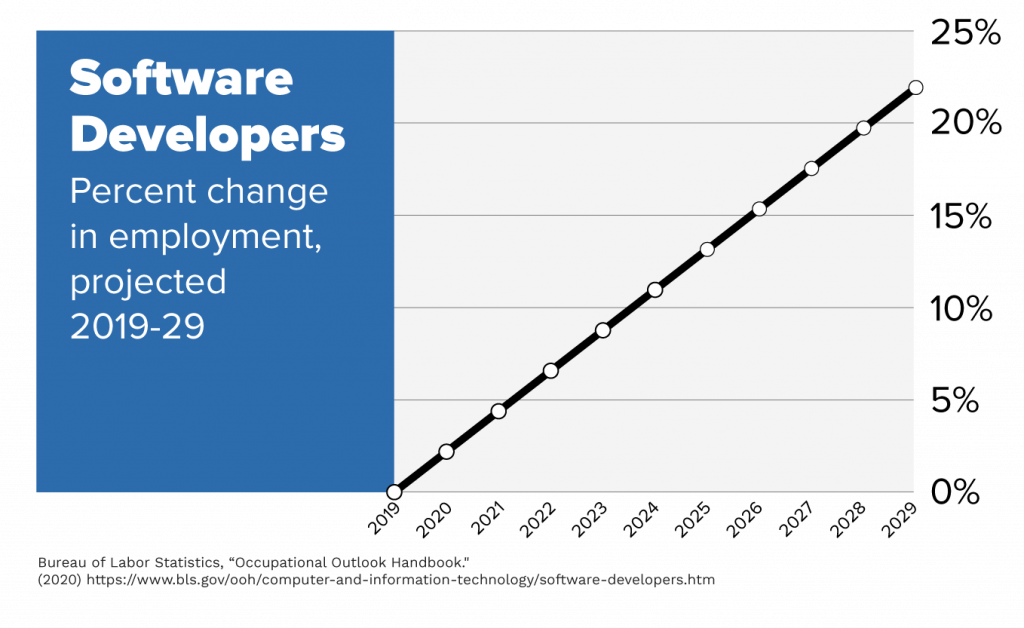Top 15 Java Project Ideas for Beginners

Programming is like riding a bike; you can read about how to do it all day, but the best way to get started is to practice. A portfolio of programming projects can help you learn coding skills while providing a professional advantage during your job search as well. Specifically, by highlighting more advanced programming projects in your portfolio, you can showcase your skills to recruiters and hiring managers which might help you land your dream job.
Creating a portfolio of projects is important for anyone wanting to enter the industry, and it’s something we cover in our guide to becoming a web developer. In this article, however, we will specifically explore Java projects for beginners.
Java is a great first programming language because it has a broad feature set and is used in a variety of applications, including desktop applications, Android apps, and iOS app development. Java is also in high demand, with 40 percent of respondents in Stack Overflow’s 2020 Developer Survey claiming to use the language.

The projects in this list focus on different skills needed to build out a well-rounded Java skill set; progressing in difficulty as the list continues.
1. Sum A + B
A sum-based project is a great way to get started with Java programming. The project is quite simple — the user will input two numbers (which are treated as the variables A and B), and the program will add them together and present the sum of A + B. This can help you learn to work with methods and integers. JavaTPoint offers a great guide for a Sum A + B project, and working through this type of project can help you become familiar with Java processes.
2. Reversing a String
In Java, strings refer to sequences of characters that behave like an object within the Java environment. It’s a very common and widely used Java data structure, storing data in an array of characters. Creating a simple application that reverses a string can help you understand strings and how they’re used in a Java environment.
For example, creating a program that reverses a string the user enters (e.g., “HELLO” to “OLLEH”). This project has many possible solutions, which is a key concept to understand as you start coding. And, oftentimes the best solution can change depending on the attributes and objective of the project you’re working on.
Check out the guide from JavaTutoring to learn more about reverse-string projects and the multiple solutions available.
3. Number Guessing Game
This is a simple game that can help you get your feet wet with Java. The game is relatively simple — the computer generates a random number, and the user must guess the number. The computer will then let the user know that their guess is too high, too low, or correct. This can be free-form, allowing an unlimited number of guesses, or give the user a set number of guesses before the game ends.
Number guessing games involve some Java programming basics like accepting inputs from the user, creating classes, and using conditional statements. GeeksforGeeks offers a number guessing game walkthrough that can help you get started.
4. Creating a Calculator
Programming a calculator is a great beginning project for people learning many different programming languages, including Java. It’s a great introduction due to its simplicity and covers many of the most basic programming concepts.
This is a great Java project for beginners because you can build your calculator’s functionality as your skills grow. Initially, your calculator might perform basic functions like addition and subtraction, building in geometric expressions and scientific calculations as your skills grow. Later on, you can also build in a more complex user interface.
UMK Games has a Java calculator app development tutorial to help you get started on your project.
5. Simple Banking Application
Creating a basic banking application is a great way to practice your Java skills, as having some grasp of the language will be needed to complete the project.
This project will introduce you to many basic Java concepts like printing, variables, if/else statements, strings, loops, and more. You’ll create an application that allows a user to check a bank balance, deposit money, withdraw money, and exit the interface. Check out this ATM/simple banking app to help you work through this project.
6. Basic Android Application
Java is the basic programming language used for Android applications, and it’s critical for anyone who wants to get into app development. Writing code for a mobile application requires unique tools and ways of thinking about how an app should operate — developing around a keyboard and mouse is very different from developing for taps and swipes.
Coding Android applications requires using an integrated development environment (IDE) called Android Studio. This environment will allow you to code across Android app ecosystems.
Creating a basic mobile application is a great project for people with some Java experience and knowledge. The Android developer community provides a walkthrough on how to create your first app — some basic Java knowledge will be needed to get started.
7. Budget Tracker
Write an application that keeps track of a household’s budget, adding fields for expenses, income, and recurring costs. This is a great project because it can scale with your abilities. As your skills grow, perhaps add a feature that lets the user specify a date range or graph out amounts each month. You can also connect your tracker to an API that inputs the correct tax rate for the user’s location.
This project may appear simple, but it can be directly applied to your life. Have you tried using a budget app but didn’t feel like it had all of the features you wanted? For this project, you can create a custom solution for your needs. You can even create your budget tracker as a smartphone app.
8. Fortune Teller
This is a simple program that can get you started working with web APIs. APIs allow two applications to talk to each other, and they’re an important part of many programming projects. APIs are commonly used in projects that interact with web-based applications, so understanding how to use them can help you become a more accomplished programmer.
Your fortune teller application can check a horoscope and display it to the user depending on their astrological sign. This is a simple application but a great way to learn something new in your Java programming journey.
9. Address Book
This project is a great option to illustrate your skills in developing applications that can interact with databases. Your application should keep track of contacts, their details (e.g., address, phone, email), and notes about each contact in a simple database.
If you’re interested in completing this project, here’s a list of prompts from Re Di School that can help you get started.
10. Currency Converter Program
Currency converters seem relatively simple — you take an amount of one currency and use a conversion rate to find the equivalent amount in another currency. It might not be the most complicated project, but it can teach you valuable skills because currency converter programs require the use of APIs in a slightly more complicated way.
This project is best suited for someone with some knowledge of Java, making it a great intermediate project. Creating a currency converter will require interacting with web APIs to get conversion rates — and then using that information to differentiate between currencies. Medium has an online currency conversion API tutorial to help you along.
11. Create a Chess Game
Chess is an ancient game that also makes for a promising intermediate Java coder project. This project involves creating classes for each element of the game, coding in the rules of chess, and creating an interactive experience for the user.
Recreating chess requires thinking about and planning how to structure the architecture of your code. You’ll need to break down a commonly understood game into its most basic components and then build these components from scratch.
For some ideas on how to build your own chess game, check out the GeeksforGeeks chess tutorial which includes code samples to help you along.
12. Snake Game
Snake is a classic video game that was created in the 1970s, gracing many computers and smartphones over the years. In this game, the player controls a snake, and the objective is to eat as many bits of food as possible. When the snake eats some food, its body grows. If the player hits its body as it moves throughout the map, they lose. This game is a bit more complicated than some previous projects we’ve discussed, making it a great project for intermediate developers.
GeeksforGeeks offers a Snake Game guide that illustrates the thought process, as well as code examples, to help you build your own game.
13. Copycat Project
Once you have some Java skills under your belt, creating a close copy of another program or service can help you learn a wider set of skills. This kind of project can help push you outside your comfort zone while practicing in-demand skills.
Think about which programs you find most useful or that are popular. Consider trying to create a text editor that’s similar to Word or Notepad. Or, you could create a web browser that operates similarly to Chrome or Safari.
While this is a more involved project that will require some level of familiarity with Java, alongside a time commitment to research and plan, the benefits to both your professional portfolio and skill set will be substantial.
14. Contribute to an Open-Source Project
Working with an open-source project is where things start to get “real” — the code you contribute could become part of a real-life piece of software that other people use. Contributing to open-source projects is a great way to build your skills, get experience working in a real-world programming environment, and show off your skills to potential recruiters and employers.
There are many open-source projects available that are always growing and changing. While contributing to an open-source project might feel intimidating at first, don’t feel discouraged. Everyone has to start somewhere, and open-source projects are where a lot of aspiring programmers polish their skills. Furthermore, finding a project with an active community can help you if you get stuck on projects in the future, so it’s well worth the time and energy investment.
GitHub is a great place to find beginner-friendly projects in a variety of languages, including Java. This GitHub Java guide will help you learn more about which projects may be right for you.
15. Build Something You Can Use
The goal of completing side projects is to build something that can be used by others. Once you have some skills under your belt, consider building a program or app that you’ll use during your time at work or school. This will give you the full experience of developing software — figuring out requirements, testing the project, and maintaining it.
What this project will look like depends on your needs. Programming can help you automate boring tasks on your system such as crunching numbers, moving files around, collecting information, or other repetitive tasks. Aspiring programmers who are in school can build tools that help them with homework and test preparation using a flashcard application. Whichever type of project you decide to pursue, you’ll benefit from both the usability of your new program or app, as well as the enhancement of your skills and portfolio.
Are These Projects Too Advanced? Here’s How You Can Get Started With Java to Build Your Portfolio
Jumping straight into a big project can feel intimidating without knowing how to code. Thankfully, there are many options available for anyone who wants to learn programming skills and start working on portfolio projects. The choice that’s right for you will depend on your goals, the amount of time you have to devote to learning, and the budget you have for your educational pursuits.
Learning to code in Java can help you get started in a variety of applicable fields, such as engineering and web development. Many of these opportunities are both lucrative and promising in their long-term job security. For example, software developers are projected to see 22 percent job growth by 2029, which is much higher than the average job growth projected for most fields in the United States.

One great way to seize this opportunity is to enroll in a coding bootcamp. These courses can provide you with a broad set of coding-related skills in a relatively short time frame, offering an introduction to crucial skills through hands-on, project-based learning. Bootcamps are also accessible to a variety of prior experience levels — everyone from career upskillers to complete beginners. Columbia Engineering Coding Boot Camp is an excellent example of a well-respected, employer-recognized bootcamp that you may wish to consider, as they offer additional continuation courses covering coding in Java and other in-demand programming languages.
Completing a degree in computer science allows students to learn coding-oriented skills across multiple years of study. Typically, degree programs require four years of full-time study (or longer if a student is only taking classes part-time). Costs vary depending on scholarships that are available and how many credit hours a student needs to graduate.
Computer science degrees can help someone learn a very broad set of skills over multiple years of study. If you’re interested in earning a degree in computer science, consider The Fu Foundation School of Engineering and Applied Science at Columbia University undergraduate program in computer science.
Alternatively, coders may opt to learn Java coding through self-guided options. There are many independent resources through which to hone Java skills and build a valuable portfolio. These may include free online courses, instructional videos, and educational apps and sites. Such resources are a great option for learning Java coding while simultaneously honing your time management and accountability skills.
One great resource for learning Java on your own is edX’s set of Java courses. Many of these courses are free, and they are based on curricula from highly ranked institutions. Some courses may offer a certificate of completion or a professional certificate for a fee.

 Live Chat
Live Chat